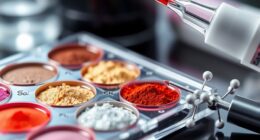Careers in cosmetic chemistry involve developing safe, effective beauty products like skincare, makeup, and haircare. You’ll need a background in chemistry or related fields, along with skills in formulation, safety testing, and industry regulations. Job opportunities include research, quality control, and product development roles in innovative environments. The field is growing, with increasing focus on sustainability and new technologies. Keep exploring, and you’ll discover how you can turn your passion into a rewarding career in cosmetic chemistry.
Key Takeaways
- Cosmetic chemists develop and test skincare, haircare, and makeup products ensuring safety, efficacy, and regulatory compliance.
- Careers often require degrees in chemistry, chemical engineering, or related fields, with opportunities for specialization and certification.
- The industry offers roles in R&D, formulation, quality control, regulatory affairs, and product innovation.
- Growth is driven by trends in sustainable ingredients, bio-based formulations, and advanced delivery systems.
- Professional organizations and industry collaborations provide networking, training, and career development opportunities.
Exploring the Role of a Cosmetic Chemist

Have you ever wondered what a cosmetic chemist does? As a cosmetic chemist, you develop and test products like skincare creams, shampoos, lipsticks, and sunscreens. You figure out how ingredients interact and guarantee your formulations are both effective and safe. Knowledge of molecular interactions helps you design products that perform as intended. You also apply your understanding of safety testing methods to identify potential allergens, irritants, or microbial issues, ensuring consumer safety. Conducting penetration testing techniques can further improve your ability to evaluate product efficacy and stability. Incorporating product stability testing into your workflow ensures that formulations maintain their quality over time. Utilizing ingredient sourcing practices ensures the quality and authenticity of the raw materials used. Implementing predictive testing techniques can further enhance your ability to foresee product stability and compatibility issues before production. Scaling formulas for mass production is a key part of your job, and you make sure products remain stable and reliable over time. You also conduct thorough safety tests to spot allergens, irritants, or microbial issues. Collaborating with marketing and regulatory teams helps you align products with trends and legal standards. Additionally, you document your research, ingredient interactions, and test results, which is essential for regulatory compliance. Your work combines creativity, scientific precision, and attention to safety, making your role crucial in the beauty industry.
Educational Pathways to a Career in Cosmetic Chemistry

Starting your journey toward a career in cosmetic chemistry involves acquiring the right educational background. Typically, you’ll need a bachelor’s degree in a scientific field like chemistry, chemical engineering, or biology. Degrees in pharmaceutical science, microbiology, or cosmetic science are also advantageous. A solid understanding of chemistry principles is essential. Completing at least two years of chemistry or biology coursework at a postsecondary institution is recommended, and some universities offer specialized programs in cosmetic science. Coursework should focus on organic, biochemistry, and analytical chemistry, along with biology and cosmetic science. Advanced options include a master’s or Ph.D. in related fields, which can boost your prospects. Gaining hands-on lab experience and internships during your studies will further prepare you for a successful career in cosmetic chemistry. Understanding how to combine raw materials to meet product goals is a key skill that can be cultivated through coursework and practical experience, as well as learning about innovative formulation techniques. Staying informed about regulatory standards and industry trends can give you a competitive edge in the field. Additionally, developing interdisciplinary knowledge can help you adapt to the evolving landscape of cosmetic science and formulation. Building awareness of the role of chemistry principles in product development can further enhance your expertise. Gaining familiarity with specialized equipment used in labs can also enhance your practical abilities and readiness for professional work.
Key Skills and Qualifications for Aspiring Chemists

To excel as a cosmetic chemist, you need a strong foundation in core scientific competencies and technical skills. You should have advanced chemistry knowledge, especially in organic and analytical chemistry, along with proficiency in mathematics for formula development. Educational requirements Microbiology expertise is vital for contamination prevention and preservative testing, while understanding materials like polymers and surfactants helps in formulation. Regulatory awareness guarantees compliance with global standards. Skilled equipment operation, formulation techniques, and stability testing are essential laboratory skills. You must master ingredient functionalities, scale formulas from lab to production, and analyze raw materials with advanced instruments. Strong communication, project management, problem-solving, and an innovative mindset round out the soft skills needed. Continuous learning and staying updated with quality assurance practices keep you ahead in this dynamic industry. Additionally, understanding special occasions and cultural sensitivities can be beneficial when developing products for diverse markets. Engaging in hackathons related to cosmetics or chemistry can also foster creativity and expose you to emerging trends and technologies in the industry. Moreover, gaining knowledge of environmental considerations can help you create sustainable and eco-friendly products that meet consumer demand and regulatory standards. Staying informed about AI security developments can also be advantageous, as emerging technologies increasingly influence product innovation and safety testing processes.
The Industry Outlook and Job Opportunities

The cosmetic industry is experiencing rapid growth, driven by increasing consumer demand for innovative, safe, and sustainable products. The global cosmetic chemicals market is projected to rise from USD 16.3 billion in 2025 to USD 25.1 billion by 2035, with a CAGR of 5.6%. This growth is supported by advancements in green chemistry and bio-based ingredients, which are becoming integral to new formulations. The overall beauty industry, including skincare, is expected to surpass USD 650 billion by 2025, with skincare making up 40%. As a professional, you’ll find opportunities in research and development, formulation, quality control, and regulatory compliance, especially as demand for natural, personalized, and eco-friendly products grows. The rise of e-commerce and digital marketing also opens new roles that combine cosmetic chemistry expertise with tech skills, reflecting a dynamic and expanding job market in the industry. Staying informed about intellectual property protections can be crucial for innovators in this competitive field. Additionally, understanding skincare patch application can be valuable for those involved in developing innovative delivery systems and targeted treatments. Moreover, expertise in regulatory compliance is increasingly important as governments implement stricter safety standards for cosmetic products. Incorporating predictive modeling can further enhance product development and consumer insights, giving professionals a competitive edge. Keeping abreast of sustainable ingredient sourcing practices can also enhance product appeal and compliance with environmental standards.
Typical Work Environments and Daily Responsibilities

Cosmetic chemists work in a variety of environments, including laboratories, offices, and manufacturing facilities, where they blend theoretical research with practical product development. Your daily tasks involve creating new products, ensuring they’re safe, effective, and compliant with regulations. You conduct stability tests to check product longevity and write detailed reports on formulations and test results. Attention to detail is vital for identifying potential issues in formulations and testing outcomes. Additionally, staying informed about industry standards helps ensure products meet evolving safety and quality requirements. Collaboration is key—you’ll work closely with marketers, designers, and regulatory experts to meet market trends and standards. Your work may be in small startups or large corporations, often full-time, with some overtime during product launches or deadlines. The environment is dynamic, requiring flexibility and continuous learning to stay updated on industry innovations, safety standards, and consumer preferences.
Collaborations and Interdisciplinary Work in the Field

Collaborations and interdisciplinary work are essential drivers of innovation and progress in cosmetic chemistry. You’ll find that academic and industry partnerships, like UCR and CALISCC, combine research with practical lab training, enhancing your skills. The program’s development over three years with industry input ensures that the curriculum remains current and industry-relevant. Programs often develop curricula with input from both sectors, ensuring relevance. Joint research initiatives enable you to work on cutting-edge formulations alongside experts. Internships and workshops provide hands-on experience and industry connections. Interdisciplinary teams, involving students from chemistry, biology, and engineering, foster diverse perspectives on product development. Attending conferences like Cosmetics Europe or PCPC allows you to network globally and stay current on trends. These collaborations accelerate innovation, giving you the opportunity to contribute to groundbreaking discoveries and advancements in the field.
Professional Development and Continuing Education

Staying current in cosmetic chemistry requires ongoing education and professional development. You can pursue certificate programs through the Society of Cosmetic Chemists, which offer courses to sharpen your skills. The SCC Certificate Program is designed to provide curated course collections and participant pathways for deeper learning, ensuring professionals stay up-to-date with industry advancements. Online training platforms provide flexible options focusing on specialized topics like organic formulations or makeup. Webinars and workshops, often free, keep you updated on industry trends and regulatory requirements. Earning professional certifications involves completing required courses and electives, boosting your expertise and credibility. These certifications are recognized industry-wide and often demand continuous learning to maintain. To stay competitive, develop strong technical, analytical, and communication skills. Participating in industry events and gaining practical experience through internships or personal projects further enhances your growth. Continuous education ensures you adapt to evolving trends and maintain a successful career in cosmetic chemistry.
Resources and Associations Supporting Cosmetic Chemists

Professional associations play an essential role in supporting your growth as a cosmetic chemist. Organizations like the Society of Cosmetic Chemists (SCC), IFSCC, and SCS provide access to crucial resources such as scientific journals, digital archives, and industry publications. They host webinars, conferences, and congresses, offering opportunities to learn from global experts and stay current with technological advances. These associations also facilitate networking through job boards, mentoring, and online member portals that include research presentations and industry news. Additionally, they promote diversity, innovation, and collaboration between academia and industry. With scholarships, awards, and educational programs, these groups help you develop your skills and advance your career. These organizations also prioritize diversity, equity, and inclusion, fostering an environment where all members can thrive and contribute.
Frequently Asked Questions
What Are the Typical Entry-Level Salaries for Cosmetic Chemists?
You’re probably wondering about typical entry-level salaries in the field. Generally, you can expect an hourly rate around $25, translating to about $55,000 to $68,250 annually.
Salaries vary by location and employer, with top companies like BASF offering higher pay. Your education, lab experience, and skills will influence your starting salary, and there’s potential for growth as you gain more experience and move into senior roles.
How Can I Transition Into Cosmetic Chemistry From Unrelated Science Fields?
To shift into cosmetic chemistry from unrelated science fields, you should start by gaining relevant lab experience and taking specialized courses or certifications in cosmetics.
Leverage your existing skills, like analytical chemistry or molecular biology, and highlight them in your applications.
Network with industry professionals through events and organizations.
Consider internships or entry-level positions to build industry-specific knowledge, and stay updated on trends like green chemistry to stand out.
Are There Any Licensing or Certification Requirements for Cosmetic Chemists?
You might wonder if you need licenses or certifications as a cosmetic chemist. Generally, most countries don’t require specific licenses.
However, earning certifications from organizations like the Society of Cosmetic Chemists can boost your credibility. You can also take specialized courses in quality and stability.
These credentials, combined with hands-on experience and a strong science background, help you stay competitive and guarantee you’re well-versed in industry standards.
What Are the Biggest Challenges Faced by Professionals in This Industry?
Imagine steering a maze of ever-changing rules and eco-conscious demands, where each turn tests your adaptability. You face regulatory hurdles that delay launches and increase costs, while consumers demand greener, more effective products.
Innovating within strict safety standards feels like balancing on a tightrope. You must constantly update formulations, source sustainable ingredients, and stay ahead of technological advances—all while ensuring your creations delight and protect your customers.
How Does Remote Work or Flexible Scheduling Apply in Cosmetic Chemistry Roles?
Remote work and flexible scheduling are increasingly common in cosmetic chemistry roles. You might find opportunities as a work-from-home chemist, account manager, or in sales, especially at startups or mid-sized companies.
While technical roles often require lab access, many positions like consulting, auditing, or project management offer remote options. You’ll need relevant certifications and proficiency with collaboration tools, making it easier to balance work and personal life while contributing to innovation.
Conclusion
If you’re passionate about beauty and science, a career in cosmetic chemistry offers exciting opportunities. Did you know the industry is projected to grow by 4% over the next decade? By developing your skills and staying connected through professional associations, you can thrive in this dynamic field. Keep exploring, learning, and experimenting—your innovative ideas could shape the future of skincare and beauty products. The world of cosmetic chemistry is waiting for your talent!









